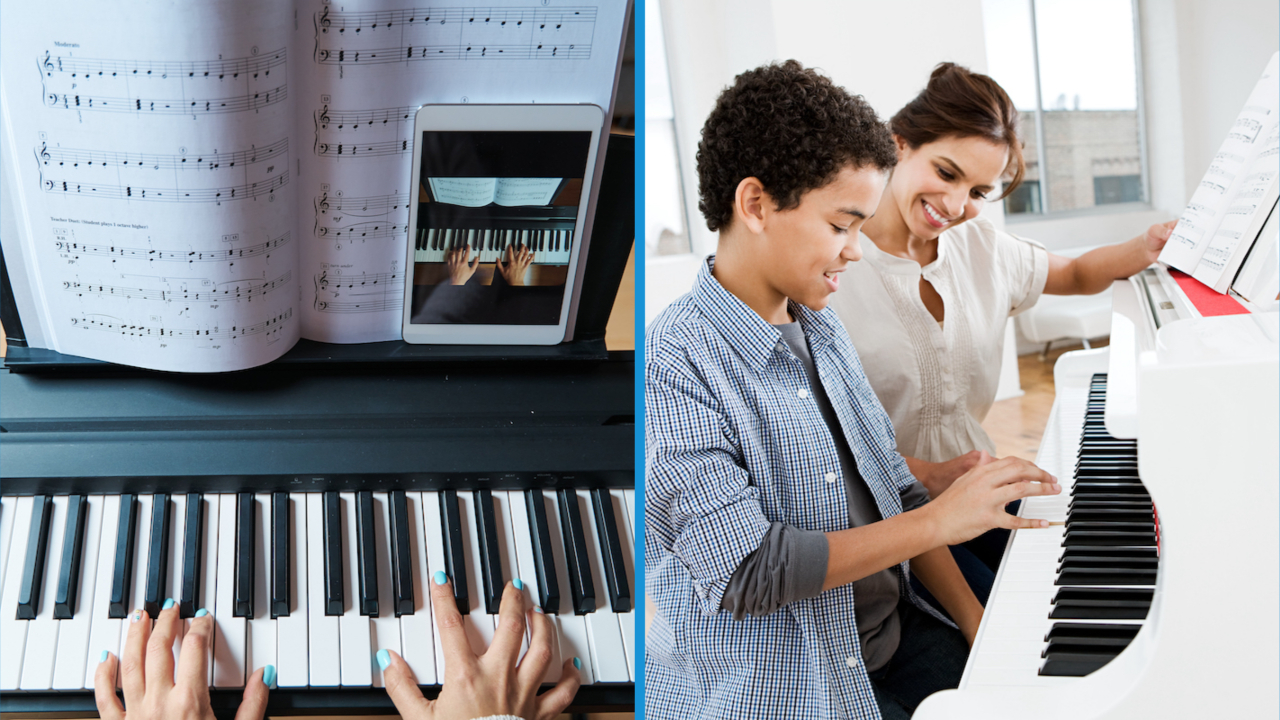Online vs face to face piano lessons: Which is right for you?
Do piano lessons work best online or in-person? We weigh up the cost and convenience of both approaches

If you're thinking of taking up the piano, we have great news - there's really never been a better time to learn. Not only is the internet packed with educational content you can access free of charge, there’s also an unprecedented number of high-quality, reputable subscription-based online piano lessons available to guide your hand(s) through the foothills of beginner piano lessons. The online learning model has exploded in popularity over the past few years, positioning itself as a convenient, affordable and pandemic-proof alternative to face-to-face lessons with a proper piano teacher.
Now that lockdown restrictions are easing and normality is sliding slowly back into view however, are in-person lessons ready to make a comeback? Should they now be something equally viable to consider when embarking on your journey to piano mastery?
Whichever is the more suitable method for you will depend on your individual needs, but by turning the spotlight on both approaches, we hope to throw the pros and cons of each into sharp relief and help make your decision between online vs face to face piano lesson a little clearer.
1. Cost
There's no escaping the fact that in-person piano lessons are going to be more expensive than online tuition. With half-hourly rates coming in at around £18/$25, a course of lessons with a real-life teacher is soon going to mount up. Like most things in life, you get what you pay for, and what you're getting for your hard-earned cash is full, personal attention from a qualified instructor for an allotted chunk of time.
Conversely, subscription-based online teaching services offer flexible programs where you can pay monthly or annually at competitive rates. For instance, Joytunes’ Simply Piano app offers various subscription levels - you can opt for 3 months for $59.99, 6 months for $89.99 or 12 months for $119.99. Most services will also include a free trial period to test the waters, with some such as Pianote offering the feature to pause your subscription and resume it later on should the need arise. The trade-off is the relative lack of personal attention, but your subscription will give you access to a wide range of high-quality educational content in a much more structured format than simply diving down the rabbit warren of free videos available online.
2. Benefits for beginners
If you're a total beginner, it'll come as no surprise that the majority of online lesson services will be heavily focussed on getting you up and running with the basics. Apps like Simply Piano offer an extremely beginner-friendly, interactive experience that combines hand-holding progression through the curriculum with a video game-style interface. With technology such as note recognition both by MIDI and audio input, quiz-based sight-reading tutorials and play-along songs, plus instantaneous feedback showing any mistakes you make as you play them, most online services offer a fun and rewarding way to get into playing the piano if you’ve just unboxed your first beginner keyboard and have no prior musical knowledge.
Meanwhile, a human teacher will obviously be quick to assess your proficiency level and adapt their lesson plans accordingly, ensuring that your first few lessons are of an appropriate complexity. Not only that, but correction of mistakes in technique at an early stage is essential to avoid falling into bad habits later on, and having a qualified teacher guiding you through the basics can be a lifesaver in this regard.
Get the MusicRadar Newsletter
Want all the hottest music and gear news, reviews, deals, features and more, direct to your inbox? Sign up here.
3. Convenience
In the convenience stakes, there's no doubt that online is the clear winner. In-person lessons tend to be structured much more rigidly, usually at a fixed time on a fixed day of the week, as you're at the mercy of the teacher's schedule, which if they're any good, will probably be fairly exacting. Meanwhile, the flexible nature of learning via an internet subscription service means that you can learn at whatever pace you'd like. Your virtual tutor is always available for whenever you have the time, a quick hour here, thirty minutes there, and it's easy to pick up exactly where you left off.
That said, the internet has impacted the world of the music tutor significantly, to the point where many have their own Patreon channels on which private one-on-one Zoom lessons are an option. Plus some exam providers such as Online Music Exams have begun to offer digital versions of graded exams, letting you take the tests from the comfort of your living room.
4. Community activities
Online services generate a sense of community by offering online forums for users to swap ideas, techniques, advice and encouragement. A good example of this is Playground Sessions, who have a dedicated forum built into their bespoke software application. Meanwhile Pianote offers weekly livestreams during which member-submitted videos are reviewed and critiqued in real time by the tutors with an audience of online attendees. On the other hand, private piano tutors of note may offer facilities such as group workshops, social events and even concerts to help overcome issues such as performance anxiety. These can help develop live performance skills as well as build confidence and stagecraft.
5. Quality of teaching materials
It goes without saying that there’s as much variety in the quality of one-on-one teachers as there is in the quality and effectiveness of online lessons - there are undoubtedly good and bad examples of each. If you’re serious about learning classical piano though, in-person lessons have the advantage of being able to focus on proper performance technique right from the start. If you manage to find a great teacher who understands your needs and you get on well with, you’ll be on to a winner. Most online services will tell you what notes to play when with which fingers, but tend to overlook advanced techniques and considerations like half-pedalling, note velocity and playing dynamics.
6. Progress tracking
Progress tracking will be a different experience depending on which route you decide to take. Online services will provide feedback by means of trophies and awards, measuring your process through the lessons in a goal-oriented approach reminiscent of a video game. This will probably have more of an appeal if you're at the younger end of the spectrum, but can be a great motivator for students of all ages. Their computer-based systems will be able to deliver a precise picture of your ongoing performance, right down to the exact percentage of wrong notes you played in a piece.
In contrast, in-person progress tracking will be a much more individual, human affair, and a good teacher will assess your progress throughout each lesson and provide you with an appropriate practice plan to follow in the interim, focussing precisely on the areas they feel need to be improved upon.
7. The masterclass model
Offering a kind of combination of the two approaches, the masterclass model involves a well-known professional artist or prominent musician regarded as a master of the instrument delivering a paid-for series of videos giving insights into their methods and techniques. A good example of this is the Herbie Hancock jazz course on www.masterclass.com, which features a ton of in-depth content from the legend himself.
Meanwhile, Harry Connick Jr has recently parted company with the Playground Sessions service in order to start up Piano Party, an online piano lesson system of his own. By their nature, masterclasses tend to be geared more towards intermediate or advanced players rather than beginners. If you’re really serious about honing your technique, companies like Finchcocks offer multi-day residential piano workshops for pianists of all levels.
8. How much will your playing improve?
It's probably fair to say that, although online services will give you a good grounding in the basics, your progress is likely to be slower than if you're closeted away with a professional teacher honing your technique with clinical precision on a one-to-one basis. In this scenario, progress can be fast-tracked and any technical errors corrected relatively quickly. The longer you take lessons for, the more noticeably your playing will improve, so it's worth signing up for a few months' worth if you're in any way serious about things.
Self-discipline is also an important consideration, especially with the online approach. Whichever route you choose, perseverance and practise are key to success, and without a second person next to you to keep you on track, or a rigid lesson schedule in your calendar, it's all too easy to fall into the habit of missing lessons or putting off practice sessions if you're that way inclined.
Related buyer’s guides
- Best digital pianos: options for every budget
- Best digital pianos for beginners: start playing with authentic sounds and feel
- Best keyboard stands: top picks for home and stage use
- Best piano benches: piano stool options for everyone
- Best piano VSTs: the best plugins to get the most authentic sound
Dave has been making music with computers since 1988 and his engineering, programming and keyboard-playing has featured on recordings by artists including George Michael, Kylie and Gary Barlow. A music technology writer since 2007, he’s Computer Music’s long-serving songwriting and music theory columnist, iCreate magazine’s resident Logic Pro expert and a regular contributor to MusicRadar and Attack Magazine. He also lectures on synthesis at Leeds Conservatoire of Music and is the author of Avid Pro Tools Basics.
MusicRadar deals of the week: Enjoy a mind-blowing $600 off a full-fat Gibson Les Paul, £500 off Kirk Hammett's Epiphone Greeny, and so much more
“For those who think they know Joel’s story, as well as those who are not as familiar, I believe this two-part film is both a revelation and a surprise”: New Billy Joel doc is on the way










